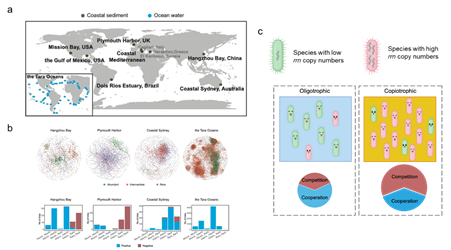Peking University, January 26, 2022: On January 10, 2022, Nature Communications published collaborative research by Professor Wen Donghui of PKU School of Environmental Science and Engineering, Professor Yang Yunfen from Tsinghua University, Professor Colin Bates from the University of Oklahoma, and others. The research, “Nutrient supply controls the linkage between species abundance and ecological interactions in marine bacterial communities” reports findings on biotic and abiotic factors influencing the differentiation of dominant or rare species in microbial communities.
Fig. A: Distribution map of data sources for bacterial communities in coastal sediment and ocean water; Fig B: Bacterial network correlation model and the positive and negative correlation between dominant and rare species; Fig C: Conceptual framework of the "Hunger Games" hypothesis.
The species diversity of microbial communities in the environment is extremely high, but there are few dominant species (ie, high-abundance species), and most of them are rare species with a relative abundance of less than 0.1% or even 0.01%. It is generally believed that dominant species and rare species differ greatly in nutritional strategies and environmental adaptations, but it remains unclear whether there are general rules of how microbial species abundances are shaped by biotic and abiotic factors.
Based on years of research on the microbial ecology of Hangzhou Bay, Wen Donghui's research team conducted a comparative study on the microbial diversity of 243 samples collected in coastal sediments (eutrophic environment) and 139 samples collected in ocean water (oligotrophic environment) around the world. The study found that the dominant species in the coastal sediments are mostly copiotrophs, which have high rrn copy numbers and fast growth rate, and are "opportunists" in the microbial community; the dominant species in oceanic seawater are mostly copiotrophs. Oligotrophs, with low rrn copy numbers and slow growth rate, can efficiently use limited resources to maintain life processes, and are "marathon runners" in the microbial community. By constructing a molecular ecological network, the study found that in eutrophic environments, fast-growing bacteria are "strong in numbers" and slow-growing bacteria are "competitively excluded"; while in oligotrophic environments, microorganisms are more inclined to "cooperate in groups" to alleviate resources Limit and sustain life processes.
As a result, the researchers put forward the "Hunger Games" hypothesis centered on environmental nutrient supply, individual growth strategies, and ecological interactions. To test this hypothesis, the researchers further set up a microcosm simulation experiment system with different levels of nutrient supply, and confirmed the influence of nutrient supply on the selection and interaction of microbes with different strategies. The Hunger Games hypothesis combines environmental selection theory, growth-rate hypothesis, evolutionary game theory, niche construction theory, and stress gradient hypothesis. Existing ecological theories and hypotheses have been expanded and extended, clearly explaining the ecological mechanism of biotic and abiotic factors synergistic regulation of microbial dominance/rare species diversity construction.
The first author of the paper is Dai Tianjiao, a 2019 doctoral graduate of PKU School of Environmental Science and Engineering (now a postdoctoral fellow at the School of Environment, Tsinghua University), while Wen Donghui and Yang Yunfeng are the corresponding authors. This work was supported by several funds.
Written by: Aqilah Anuar
Edited by: Ye Yimeng
Source: PKU News (Chinese)
